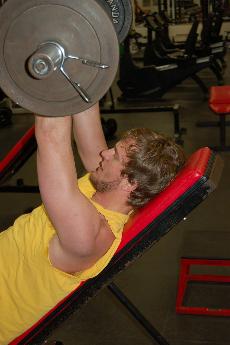Fighting the post-graduation battle of the bulge

April 11, 2007
We all have heard about the freshman 15. However, what many of us aren’t prepared for is the inevitable lack of activity and the increased demands on our time following our graduation from college.
Soon people will find themselves trying to balance a nine-to-five along with personal relationships and perhaps a family. What can new graduates do to counter this turn of events?
In college, oftentimes students have the luxury of being able to work out when they want. Usually a student can find an hour or two during a given day to get in the weight room or go for a run.
However, this could all change when those students find themselves in the “real world.” When outside factors begin to vie for your time, the secret is to do what you can with what you have.
“Don’t have an all-or-nothing mentality,” said Justin Snyder, head strength and conditioning coach. “You can still accomplish a lot of good things by utilizing 20 minutes here or there.”
Snyder suggests that, rather than aiming to get a full workout in during one setting, split it up according to the time you have.
Also, it is not imperative that you get to the gym to get exercise. Many times you can utilize your environment to customize your workout.
“Be creative,” Snyder said. “Look at your surroundings and look at ways you can use your body weight or the things in nature or the things in your garage to provide resistance.”
For some, staying in shape may even be a job requirement. Jeff Poen, a criminal justice major and football player from the class of 2006, needs to maintain good physical health to actually land a job.
“I know that, somewhere down the line, I have to take a physical fitness test in order to get a job,” Poen said. “So it is really important to me to stay in shape.”
Last summer, Poen didn’t have access to a weight room, so he supplemented his running with pushups, sit-ups and other body weight exercises. However a person decides to stay in shape, the key to experience the long-term benefits of exercising is consistency and discipline.
“You’ve got to have a regimen or you don’t do it,” said Fred Jones, professor of sociology and criminal justice. “You’ve got to try to not let things infringe on that.”
Jones is 63 years young, and works out for at least an hour five times a week. During the winter months, he wakes up at 5 a.m. every morning to exercise. During the summer months, he rides his bike with President John Byrd from Indianola to Carlisle five times a week.
Besides exercise, the other key to staying fit is nutrition. Remember when you were a kid and could eat anything you wanted without gaining a pound? Unfortunately, those days are long gone, never to be seen again.
No matter how painful it is, nutrition is an important part of a healthy lifestyle.
“Even as we get older and our lives get more sedate, most of us don’t change our eating patterns,” Jones said. “This is when we tend to gain weight.”
There is no way to get around maintaining a healthy diet. Snyder suggests staying away from the latest fad and focusing on fruits, vegetables, whole wheat carbohydrates and sources of lean protein. For many, that means avoiding the goodies Pfeiffer Dining Hall offers every day.
“If you are dining on cheeseburgers for lunch and pizza slices for supper with an ice cream cone on the way out, you’re going to be fat,” Snyder said.
When all is said and done, you need to use your better judgment when it comes to exercise and eating right. The right balance of these two factors will make you feel better both physically and mentally.
“Exercise won’t necessarily increase your life span,” Jones said, “but it will increase the quality of your life.”





